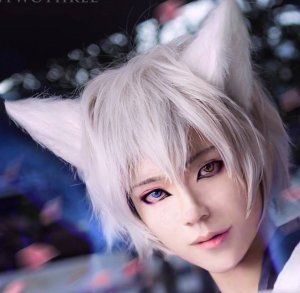Fast Moving Action Packed with Tons of Romance and Humor
When the drama concluded, I was very pleased with the ending. I thought all the beloved characters were safe and sound despite everything they had endured. But then, I started hearing complaints that the ending was AI-generated and completely altered the original story’s conclusion. This is unfortunate because the more I read about the original version, the more I prefer it. I wish the production team hadn’t made such dramatic changes to such an intriguing and lovely story.
This is a tale about demons and humans coexisting. Though it’s an action-packed adventure, it’s infused with humor and romance. I loved everything about this drama—the characters, the acting, the setting, and the cinematography. Even the CGIs were very well done and believable. The storytelling is impeccable, with intricate details and revelations that respect the audience’s intelligence.
The story unfolds in four main arcs: the Mirror Demon arc, the Puppet Demon arc, the Painting Demon arc, and finally, the "Who Am I" arc. Each arc is richly detailed, blending humor, Chinese folklore, and cultural elements. Most importantly, through these arcs, we see the romance between the main leads blossom and the characters grow. Each arc also explores a universal human fear and the lessons learned from it.
In the first arc, Banxia (played by Song Zu’er) is timid and unsure of herself. But by the final arc, she becomes strong and courageous. Though initially easily frightened due to her traumatic childhood, she’s never an annoying weakling—she stands up against injustice and helps the vulnerable. The Mirror Demon arc also delves into the fear of losing beauty with age, driving people to seek eternal youth—a deeply relatable human concern.
The second arc takes our characters to a scenic resort where everything is so tranquil that one could lose themselves in its lifestyle forever. It also explores society’s obsession with perfection, as the antagonist seeks the ideal human features—eventually fixating on Banxia. This arc exposes how the pursuit of perfection can lead to immorality and crime.
The third arc is about the Painting Demon. It creates a "Groundhog Day" scenario where people inside the painting live the same day over and over—never aging, never dying. This reflects humanity’s quest for immortality, but when viewed from the outside, seeing each day repeat endlessly, eternal life somehow becomes meaningless. It’s eerily similar to how we sometimes live our own lives, stuck in monotonous routines—only this time, we see it reflected in a painting.
The final arc poses a question we often ask ourselves: "Who am I?" If given a choice, what would we choose? This is Xuanye’s dilemma: Should he choose duty over love, leaving his beloved to suffer, or choose love and let the world fall into ruin? In the AI-generated ending, he picks duty, but in the original version, he finds a way to have both—love and the world.
In every arc, I love how Xuanye’s intelligence allows him to piece things together before the truth is revealed. And when he misses something, Banxia fills in the gaps. Their romance is subtle yet unmistakable—there’s no ego or pride between them. They’re honest with each other, openly expressing their displeasure and communicating their thoughts and desires.
Both Ren Jialun and Song Zu’er are seasoned actors. Though there’s an age gap (Ren Jialun is 36, while Song Zu’er is 26), Ren Jialun looks youthful enough to match Song Zu’er perfectly. Most importantly, their chemistry is amazing—especially Song Zu’er’s unapologetically bold demeanor with her co-star.
Final Thoughts
Right after the finale, I applauded the ending. I thought it was satisfying that Xuanye rewrote the story, undoing the deaths of beloved characters. But after reading viewers’ insights about the original ending, I started having second thoughts. As much as I didn’t want those characters to die, having Xuanye reverse everything in less than half an episode—especially with an AI-generated conclusion—feels messy and emotionally hollow. Now, I agree with many viewers: the story should have stuck to the original ending, keeping the tragic deaths but giving Banxia and Xuanye a better life together.
Action-packed, infused with humor and romance, great CGI and cinematography, stellar acting, well-developed characters.
Despite my mixed feelings about the ending, I still love this drama and highly recommend it to everyone.
Two thumbs up. A must-watch!
This is a tale about demons and humans coexisting. Though it’s an action-packed adventure, it’s infused with humor and romance. I loved everything about this drama—the characters, the acting, the setting, and the cinematography. Even the CGIs were very well done and believable. The storytelling is impeccable, with intricate details and revelations that respect the audience’s intelligence.
The story unfolds in four main arcs: the Mirror Demon arc, the Puppet Demon arc, the Painting Demon arc, and finally, the "Who Am I" arc. Each arc is richly detailed, blending humor, Chinese folklore, and cultural elements. Most importantly, through these arcs, we see the romance between the main leads blossom and the characters grow. Each arc also explores a universal human fear and the lessons learned from it.
In the first arc, Banxia (played by Song Zu’er) is timid and unsure of herself. But by the final arc, she becomes strong and courageous. Though initially easily frightened due to her traumatic childhood, she’s never an annoying weakling—she stands up against injustice and helps the vulnerable. The Mirror Demon arc also delves into the fear of losing beauty with age, driving people to seek eternal youth—a deeply relatable human concern.
The second arc takes our characters to a scenic resort where everything is so tranquil that one could lose themselves in its lifestyle forever. It also explores society’s obsession with perfection, as the antagonist seeks the ideal human features—eventually fixating on Banxia. This arc exposes how the pursuit of perfection can lead to immorality and crime.
The third arc is about the Painting Demon. It creates a "Groundhog Day" scenario where people inside the painting live the same day over and over—never aging, never dying. This reflects humanity’s quest for immortality, but when viewed from the outside, seeing each day repeat endlessly, eternal life somehow becomes meaningless. It’s eerily similar to how we sometimes live our own lives, stuck in monotonous routines—only this time, we see it reflected in a painting.
The final arc poses a question we often ask ourselves: "Who am I?" If given a choice, what would we choose? This is Xuanye’s dilemma: Should he choose duty over love, leaving his beloved to suffer, or choose love and let the world fall into ruin? In the AI-generated ending, he picks duty, but in the original version, he finds a way to have both—love and the world.
In every arc, I love how Xuanye’s intelligence allows him to piece things together before the truth is revealed. And when he misses something, Banxia fills in the gaps. Their romance is subtle yet unmistakable—there’s no ego or pride between them. They’re honest with each other, openly expressing their displeasure and communicating their thoughts and desires.
Both Ren Jialun and Song Zu’er are seasoned actors. Though there’s an age gap (Ren Jialun is 36, while Song Zu’er is 26), Ren Jialun looks youthful enough to match Song Zu’er perfectly. Most importantly, their chemistry is amazing—especially Song Zu’er’s unapologetically bold demeanor with her co-star.
Final Thoughts
Right after the finale, I applauded the ending. I thought it was satisfying that Xuanye rewrote the story, undoing the deaths of beloved characters. But after reading viewers’ insights about the original ending, I started having second thoughts. As much as I didn’t want those characters to die, having Xuanye reverse everything in less than half an episode—especially with an AI-generated conclusion—feels messy and emotionally hollow. Now, I agree with many viewers: the story should have stuck to the original ending, keeping the tragic deaths but giving Banxia and Xuanye a better life together.
Action-packed, infused with humor and romance, great CGI and cinematography, stellar acting, well-developed characters.
Despite my mixed feelings about the ending, I still love this drama and highly recommend it to everyone.
Two thumbs up. A must-watch!
Was this review helpful to you?


 2
2 7
7 1
1





















